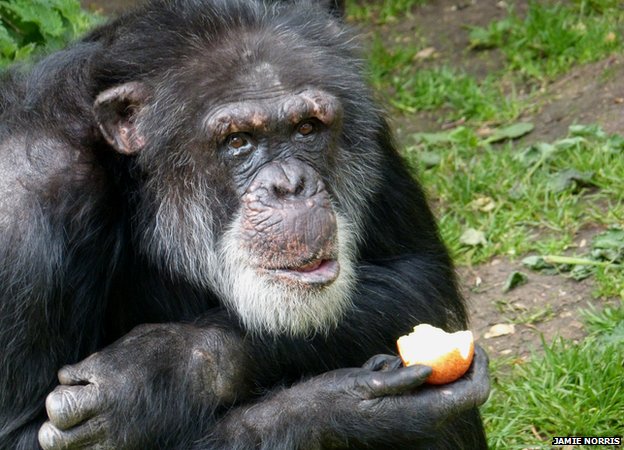New research led by scientists from the University of York and the University of Zurich provide the first evidence that chimpanzees can ‘learn’ calls that refer to particular objects.
The paper by Watson, SK., Townsend, SW, Schel, AM., Wilke, C., Wallace, EK., Cheng, L., West, V. and Slocombe, KE. ‘Vocal Learning in the Functionally Referential Food Grunts of Chimpanzees’ has just been published in Current Biology.
Over many years researchers here at RZSS Edinburgh Zoo have been studying the various food calls of our chimpanzees. Dr Katie Slocombe, one of the senior scientists on this recently released paper has been involved in researching Edinburgh’s chimpanzees since 2002, so she and her colleagues have gathered a great wealth of knowledge on our troop.
If you are a regular follower of this blog or a visitor to Edinburgh Zoo you may know that in 2010 a new group of adult chimpanzees from Beekse Bergen Safari Park in the Netherlands were integrated with our Edinburgh chimpanzees. These new additions to our troop gave researchers a unique opportunity to investigate whether chimpanzees can change their food calls when they become incorporated into a new group.
Chimpanzees give distinct grunts when they find different types of food, and other chimpanzees understand the meaning of those grunts. They will give a high pitched sound for a preferred food and lower for less preferred item. Katie, Stuart and their colleagues found before integration the animals had different grunts for apples as well as different preferences for apples. They discovered that the Dutch chimpanzees modified their grunts referring to apples so that, three years after integration of the two groups, their calls were very similar to those produced by the resident Edinburgh chimpanzees.
Does this mean our Dutch chimps have learnt to speak Scottish?
Want to learn more about how we study chimpanzee communication, watch one of our learning resources videos.
[ylwm_vimeo]47863597[/ylwm_vimeo]
or click on this BBC news link below to hear more about this amazing research and what our zoo visitors think too!

